八年级下册重点语法和短语
英语(八年级下册英语重点语法与短语)经典版

八年级下册重点语法和短语Unit 1 Will people have robots?重点语法:一般将来时态的应用do/does 的一般将来时态形式:(shall/will) dodo/does 的一般将来时态的被动语态:(shall/will) be done 一般将来时态的肯定句、否定句、疑问句形式:肯定句例句:People will have robots in a few years.否定句例句:People (will not/won't) have robots in a few years. 一般疑问句例句:Will people have robots in a few years?特殊疑问句例句:What will people have in a few years?重点短语:won't = will notthey'll = they willshe'll = she willhe'll = he willI'll = I willfall in love with(sb./sth.) 爱上(某人/某物)be able to do sth. 能够做某事come true 实现in the future 未来hundreds of 数以百计的thousands of 数以千计的look for(sb./sth.) 寻找(某人/某物)will → would 情态动词will 的原形和过去式may → might 情态动词may 的原形和过去式Reading Strategy(阅读方法)Look at the title and picture, and predict what you will read about. (看着标题和图片,预知你要阅读那些方面的内容。
)This helps you get ready to acquire new information. (这样可以帮助你获得一些新的信息。
八年级下册英语知识点总结归纳

八年级下册英语知识点总结归纳八班级下册英语学问点【1】【重点短语】1. fewer people 更少的人(fewer修饰名词复数,表示否认)2. less free time 更少的空闲时间(less修饰不行数名词,表示否认)3. in ten years 10年后(in的时间短语用于将来时,提问用How soon)4. fall in love with… 爱上…例:When I met Mr. Xu for the first time, I fell in love with him at once当我第一次见到许老师,我立即爱上他5. live alone 单独居住6. feel lonely 感到孤独(比较:live alone/go along等)The girl walked alone along the street, but she didn’t feel lonely那女孩单独沿着街道走,但她并不感到孤独7. keep/feed a pet pig 养一头宠物猪8. fly to the moon 飞上月球9. hundreds of +复数数百/几百(概数,类似还有thousands of; millions of)10. the same as 和……相同11. A be different from B A与B不同(=There is adifference/Thgere are differences between A and B)12. wake up 醒来(wake sb. up表示“唤醒某人”13. get bored 变得厌倦(get/become是连系动词,后跟形容词如tired/angry/excited等)14. go skating 去滑冰(类似还有go hiking/fishing /skating/bike riding等)15. lots of/a lot of 很多(修饰可数名词、不行数名词都可以)16. at the weekends 在周末17. study at home on computers 在家通过电脑学习18. agree with sb. 同意某人(的看法)19. I don’t agree. = I disagree. 我不同意20. on a piece of paper 在一张纸上(留意paper/information/news/work/homework/housework等常考到的不行数名词)21. on vacation 度假22. help sb with sth/help sb do sth 关心某人做某事23. many different kinds of goldfish 很多不同种金鱼24. live in an apartment 住在公寓里/live on the twelfth floor 住在12楼25. live at NO.332,Shanghai Street 住在上海路332号26. as a reporter 作为一名记者27. look smart 显得精神/看起来聪慧28. Are you kidding? 你在骗我吗2022八班级下册英语学问点29. in the future 在将来/在将来30. no more=not …anymore 不再(强调多次发生的动作不再发生)I’ll go there no more.31. no longer=not… any lo nger 不再(强调状态不再发生)32. besides(除…之外还,包括)与except …but(除…之外,不包括)33. be able to与can 能、会34.be big and crowded 大而且拥挤34. be in college 在上高校35. live on a space station 住在空间站36. dress casually 穿得很随便casual clothing 休闲服饰37. win the next World Cup 赢得世界杯 win award 获僵38. come true 变成现实39. take hundreds of years 花几百年的时间40. be fun to watch 看起来好玩41. over and over again 一次又一次42. be in different shapes 样子不同43. twenty years from now 今后20年八班级下册英语学问点【2】【重点语法】一般将来时表示将要发生的动作或存在的状态。
英语八下人教版重点语法

英语八下人教版重点语法
英语八下人教版的重点语法包括:
1.过去完成时(Past Perfect Tense):用来表示在过去某个时间或动作之前已经发生或完成的动作。
例如:I had already
finished my homework before my mom came back.
2.时间状语从句(Time clauses):用来表示时间关系的从句,一般以when,as soon as,until,before,after等引导。
例如:We will go to the park when it stops raining.
3.条件状语从句(Conditional clauses):用来表示假设条件的从句,一般以if引导。
例如:If it rains tomorrow, we will stay at home.
4.动词不定式(Infinitives):用来表示目的、原因、建议等。
例如:I went to the store to buy some groceries.
5.被动语态(Passive voice):用来强调动作的承受者而不是执行者。
例如:The cake was made by my mom.
6.定语从句(Relative clauses):用来修饰名词或代词的从句,一般由关系代词who,which,that引导。
例如:The boy who won
the competition is my neighbor.
这些语法结构在英语八下人教版教材中经常出现,需要学生掌握
和应用。
希望以上回答能对您有帮助。
人教版八年级下册英语Unit 10单元语法知识点总结

人教版八年级下册英语Unit 10单元语法知识点总结本单元重点短语的具体用法1. "These days":表示目前或现在的情况。
例如:These days, more and more people are using mobile phones.(现在,越来越多的人使用手机。
)2. "Regard with great interest":表示以极大的兴趣关注着。
例如:I always regard with great interest the development of technology.(我总是以极大的兴趣关注着技术的发展。
)3. "In order to":表示目的。
例如:She studies hard in order to get good grades.(她努力学习是为了取得好成绩。
)4. "So far":迄今为止,到现在为止。
例如:So far, we have learneda lot of new knowledge.(到目前为止,我们已经学到了很多新知识。
)5. "In need":需要。
例如:We should help those in need.(我们应该帮助那些需要帮助的人。
)6. "Not...anymore":不再......例如:He doesn't play basketball anymore.(他不再打篮球了。
)7. "Welcome to sp.":欢迎来到......例如:Welcome to our school.(欢迎来到我们学校。
)8. "Check out":察看、观察。
例如:Let's check out the new restaurant.(我们去看看那家新餐厅吧。
(完整版)人教版英语八年级下册重点词组、句型及语法点汇总,推荐文档
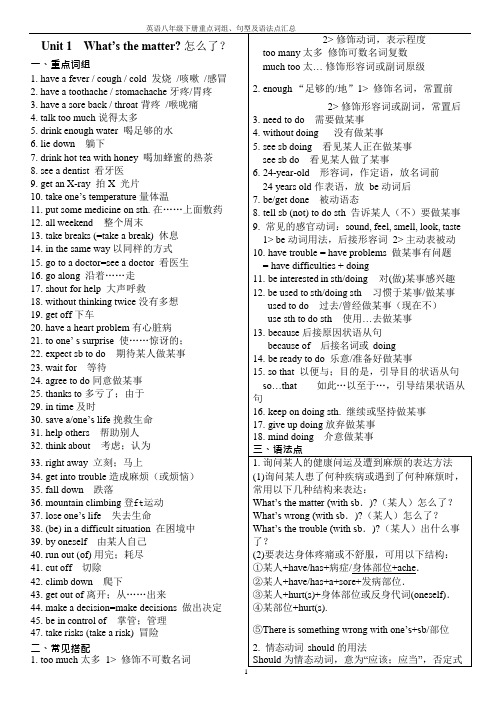
13.be back 回来14.be angry with sb 生某人的气15.throw down 扔下16.the minute=as soon as 一…就…e over 过来18.sit down 坐下19.take sb. for a walk 带某人去散步20.all the time 频繁;反复21.all day / evening 整日/夜22.shout back 大声回应23.walk away 走开24.in surprise 惊讶地25.share the housework 分担家务26.hang out 闲逛27.do chores 做杂务28.go to the store 去商店29.buy drinks and snacks 买饮料和点心30.make sb. do sth. 使某人做某事31.have enough stress from 有来自…足够的压力32.a waste of time 浪费时间33.in order to 为了34.get good grades 取得好成绩35.depend on 依赖;依靠36.have no idea 不知道37.develop children’s independence 发展孩子独立性38.look after=take care of 照顾;照看39.as a result 结果40.agree with sb 同意某人的观点/意见disagree with sb 不同意某人的观点/意见二、常见搭配1.finish doing sth. 完成做某事2.a few “几个”,后接可数名词复数few “很少,几乎没有”,后接可数名词复数a little “一点儿”,后接不可数名词little “很少,几乎没有”,后接不可数名词3.1> question “问题”,需要回答的问题,与ask或answer 搭配2> problem “问题”,需要解决的问题,与solve 搭配in the front of “在…前面”,在所说范围之内5.as…as… “与…一样…”,中间加形容词或副词原级,。
八年级下册英语各单元重点短语+句型语法 人教版

八年级下册英语各单元重点短语+句型语法人教版1. Unit 1Important phrases:- get to know: I want to get to know my new classmates.- make friends with: I hope to make friends with some local students.- be interested in: She is interested in learning a new language.- take part in: Are you going to take part in the school talent show?- show off: Don't show off in front of your friends.- be proud of: I am proud of my brother for winning the race.Sentence patterns and grammar:- Present continuous tense: He is playing football in the park.- Comparative adjectives: My sister is taller than me.- Superlative adjectives: This is the best pizza I've ever tasted.2. Unit 2Important phrases:- turn off: Don't forget to turn off the lights before you leave.- set off: We will set off for the beach early in the morning.- look forward to: I am looking forward to the schooltrip next week.- get along with: I get along with my classmates very well.- break down: Our car broke down on the way to the airport.- run out of: We ran out of milk, so I need to go to the store.Sentence patterns and grammar:- Past continuous tense: They were playing basketball when the rain started.- Modal verbs: You should study harder for the exam.- Reported speech: She said that she was going to the movies.3. Unit 3Important phrases:- be strict with: My teacher is very strict with homework deadlines.- get into: She wants to get into a good university.- take care of: Don't forget to take care of your little brother.- be good at: I am good at playing the piano.- look up to: I look up to my older sister as a role model.- come up with: We need to come up with a plan for the project.Sentence patterns and grammar:- Future perfect tense: By next year, I will havefinished high school.- Present perfect continuous tense: She has been studying English for five years.- Conditional sentences: If I had known, I would have helped you.4. Unit 4Important phrases:- call for: This situation calls for a serious discussion.- hold on: Please hold on while I transfer your call.- look out: Look out for the car coming down the road.- put off: Don't put off until tomorrow what you can do today.- try out: I want to try out for the school basketball team.- fall apart: Our friendship fell apart after the argument.Sentence patterns and grammar:- Present perfect tense: I have finished my homework.- Past perfect tense: She had already left when I arrived.- Passive voice: The cake was made by my mom.5. Unit 5Important phrases:- set up: We need to set up the equipment for the presentation.- take off: The plane will take off in an hour.- go through: I will go through my notes before the exam.- look into: The police will look into the matter.- pick up: Can you pick up some milk on your way home?- be satisfied with: I am satisfied with my test results.Sentence patterns and grammar:- Future continuous tense: They will be having dinner at7 PM.- Reported questions: He asked her where she was goingfor the holidays.- Relative clauses: The boy who won the race is my friend.6. Unit 6Important phrases:- be proud of: She is proud of her achievements.- look after: My sister looks after our pet dog.- give up: Don't give up on your dreams.- make a decision: I need to make a decision about which college to attend.- put up with: I can't put up with his behavior any longer.- take after: My son takes after his father in terms of looks.Sentence patterns and grammar:- Past perfect continuous tense: She had been studying all night when her parents arrived.- Reported commands: He told her to clean her room.- Adverb clauses: I will call you when I get home.。
人教版八年级英语下册各单元知识点汇总
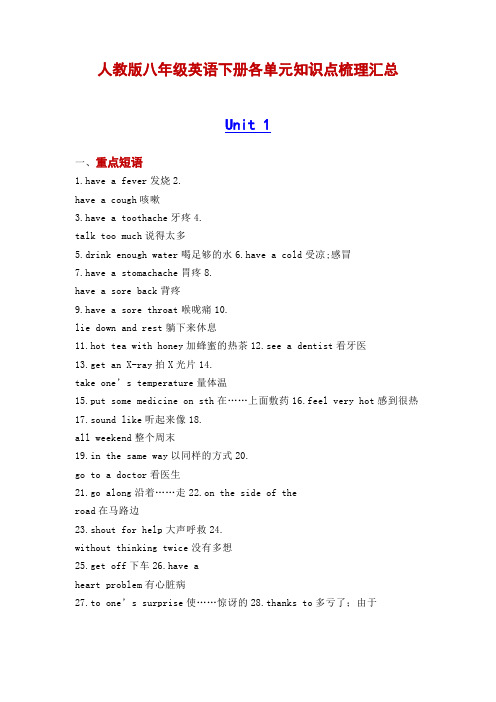
人教版八年级英语下册各单元知识点梳理汇总Unit 1一、重点短语1.have a fever发烧2.have a cough咳嗽3.have a toothache牙疼4.talk too much说得太多5.drink enough water喝足够的水6.have a cold受凉;感冒7.have a stomachache胃疼8.have a sore back背疼9.have a sore throat喉咙痛10.lie down and rest躺下来休息11.hot tea with honey加蜂蜜的热茶12.see a dentist看牙医13.get an X-ray拍X光片14.take one’s temperature量体温15.put some medicine on sth在……上面敷药16.feel very hot感到很热17.sound like听起来像18.all weekend整个周末19.in the same way以同样的方式20.go to a doctor看医生21.go along沿着……走22.on the side of theroad在马路边23.shout for help大声呼救24.without thinking twice没有多想25.get off下车26.have aheart problem有心脏病27.to one’s surprise使……惊讶的28.thanks to多亏了;由于29.in time及时30.save a life挽救生命31.get into trouble造成麻烦32.right away立刻;马上33.because of由于34.get out of离开35.hurt oneself受伤36.put a bandage on sth.用绷带包扎37.fall down摔倒38.feel sick感到恶心39.have a nosebleed流鼻血40.cut his knee割伤他的膝盖41.put her head back把她的头向后仰42.have problems breathing呼吸困难43.mountain climbing登山运动44.be used to doing sth.习惯做某事45.run out(of)用完;用尽46.so that以便47.so…that如此……以至于……48.be in control of掌管;管理49.in a difficult situation在逆境屮50.keep on doing sth.坚持做某事51.make a decision做出决定52.take risks冒险53.give up放弃二、重点句型1.You need to take breaks away from the computer.你需要远离电脑,休息一下。
仁爱英语八年级下册知识点总结
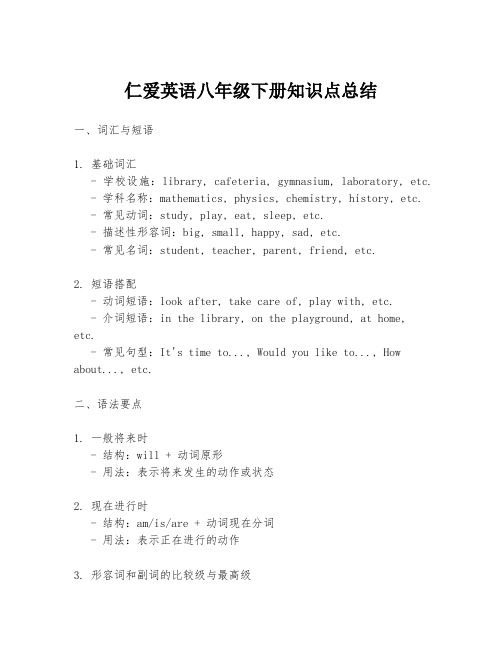
仁爱英语八年级下册知识点总结一、词汇与短语1. 基础词汇- 学校设施:library, cafeteria, gymnasium, laboratory, etc. - 学科名称:mathematics, physics, chemistry, history, etc. - 常见动词:study, play, eat, sleep, etc.- 描述性形容词:big, small, happy, sad, etc.- 常见名词:student, teacher, parent, friend, etc.2. 短语搭配- 动词短语:look after, take care of, play with, etc.- 介词短语:in the library, on the playground, at home, etc.- 常见句型:It's time to..., Would you like to..., How about..., etc.二、语法要点1. 一般将来时- 结构:will + 动词原形- 用法:表示将来发生的动作或状态2. 现在进行时- 结构:am/is/are + 动词现在分词- 用法:表示正在进行的动作3. 形容词和副词的比较级与最高级- 比较级:通常加-er 或使用more,less- 最高级:通常加-est 或使用most4. 可数名词与不可数名词- 可数名词:可以用数字计数的名词- 不可数名词:不能用数字计数的名词5. 代词的使用- 人称代词:I, you, he, she, it, we, they- 物主代词:my, your, his, her, its, our, their- 反身代词:myself, yourself, himself, herself, itself, ourselves, yourselves, themselves三、阅读理解技巧1. 快速阅读(Skimming)- 快速浏览文章,抓住主要信息2. 精读(Scanning)- 仔细阅读文章,理解细节内容3. 推理判断(Inference)- 根据上下文推断词义或作者意图四、写作技巧1. 描述性写作- 描述人物、地点、事件或物品2. 叙事性写作- 讲述一个故事或事件的发生过程3. 议论性写作- 表达观点,提供论据,进行论证五、听力技巧1. 预测(Prediction)- 根据题目或图片预测对话或短文的内容2. 捕捉关键信息(Key Information)- 注意数字、时间、地点等关键信息3. 理解大意(Main Idea)- 抓住对话或短文的中心思想六、口语表达1. 日常交流- 问候、自我介绍、询问信息等2. 描述与叙述- 描述经历、叙述事件等3. 表达观点- 讨论、辩论、表达个人看法等七、文化知识1. 英语国家的节日与习俗- 了解不同国家的节日和相关习俗2. 英语习语和俚语- 学习并运用常见的英语习语和俚语3. 英语国家的历史与地理- 了解英语国家的基本历史和地理知识八、学习策略1. 制定学习计划- 设定学习目标,规划学习时间和内容2. 有效记忆- 运用联想记忆、分组记忆等方法记忆单词和语法点3. 自我检测- 定期进行自我测试,检查学习效果以上是仁爱英语八年级下册的主要知识点总结。
八下英语各单元短语
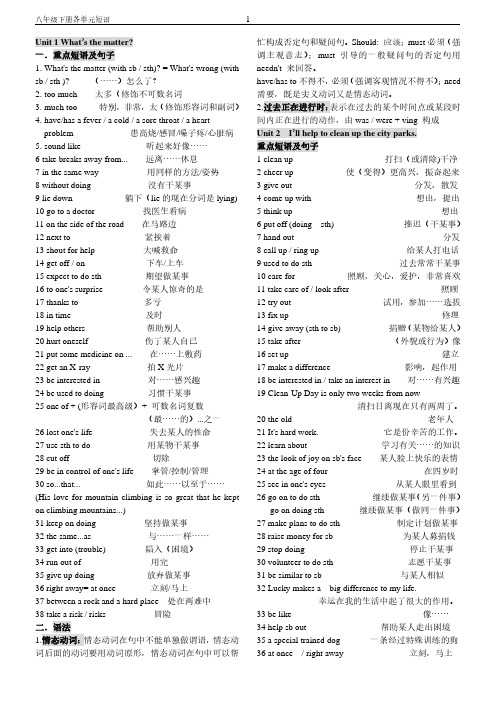
Unit 1 What’s the matter?一.重点短语及句子1.What's the matter (with sb / sth)? = What's wrong (with sb / sth )? (……)怎么了?2.too much 太多(修饰不可数名词3.much too 特别,非常,太(修饰形容词和副词)4.have/has a fever / a cold / a sore throat / a heart problem 患高烧/感冒/嗓子疼/心脏病5.sound like 听起来好像……6 take breaks away from... 远离……休息7 in the same way 用同样的方法/姿势8 without doing 没有干某事9 lie down 躺下(lie的现在分词是lying)10 go to a doctor 找医生看病11 on the side of the road 在马路边12 next to 紧挨着13 shout for help 大喊救命14 get off / on 下车/上车15 expect to do sth 期望做某事16 to one's surprise 令某人惊奇的是17 thanks to 多亏18 in time 及时19 help others 帮助别人20 hurt oneself 伤了某人自己21 put some medicine on ... 在……上敷药22 get an X-ray 拍X光片23 be interested in 对……感兴趣24 be used to doing 习惯干某事25 one of + (形容词最高级)+ 可数名词复数(最……的)...之一26 lost one's life 失去某人的性命27 use sth to do 用某物干某事28 cut off 切除29 be in control of one's life 掌管/控制/管理30 so...that... 如此……以至于……(His love for mountain climbing is so great that he kept on climbing mountains...)31 keep on doing 坚持做某事32 the same...as 与……一样……33 get into (trouble) 陷入(困境)34 run out of 用完35 give up doing 放弃做某事36 right away= at once 立刻/马上37 between a rock and a hard place 处在两难中38 take a risk / risks 冒险二.语法1.情态动词:情态动词在句中不能单独做谓语,情态动词后面的动词要用动词原形,情态动词在句中可以帮忙构成否定句和疑问句。
人教版初中英语八年级下册全册各单元知识点、语法归纳整理
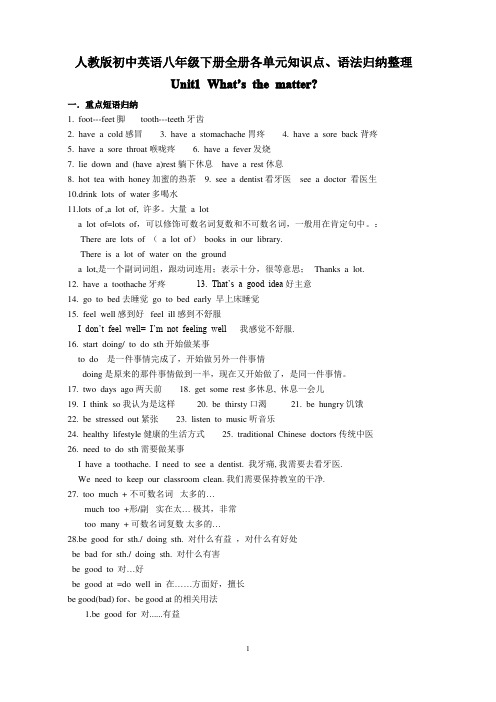
人教版初中英语八年级下册全册各单元知识点、语法归纳整理Unit1W hat’s the matter?一.重点短语归纳1.foot---feet脚tooth---teeth牙齿2.have a cold感冒3.have a stomachache胃疼4.have a sore back背疼5.have a sore throat喉咙疼6.have a fever发烧7.lie down and(have a)rest躺下休息have a rest休息8.hot tea with honey加蜜的热茶9.see a dentist看牙医see a doctor看医生10.drink lots of water多喝水11.lots of ,a lot of,许多。
大量a lota lot of=lots of,可以修饰可数名词复数和不可数名词,一般用在肯定句中。
:There are lots of(a lot of)books in our library.There is a lot of water on the grounda lot,是一个副词词组,跟动词连用;表示十分,很等意思;Thanks a lot.12.have a toothache牙疼13.That’s a good idea好主意14.go to bed去睡觉go to bed early早上床睡觉15.feel well感到好 feel ill感到不舒服I don’t feel well=I’m not feeling well我感觉不舒服.16.start doing/to do sth开始做某事to do是一件事情完成了,开始做另外一件事情doing是原来的那件事情做到一半,现在又开始做了,是同一件事情。
17.two days ago两天前18.get some rest多休息,休息一会儿19.I think so我认为是这样20.be thirsty口渴21.be hungry饥饿22.be stressed out紧张23.listen to music听音乐24.healthy lifestyle健康的生活方式25.traditional Chinese doctors传统中医26.need to do sth需要做某事I have a toothache.I need to see a dentist.我牙痛,我需要去看牙医.We need to keep our classroom clean.我们需要保持教室的干净.27.too much+不可数名词太多的…much too+形/副实在太…极其,非常too many+可数名词复数太多的…28.be good for sth./doing sth.对什么有益,对什么有好处be bad for sth./doing sth.对什么有害be good to对…好be good at=do well in在……方面好,擅长be good(bad) for、be good at的相关用法1.be good for对......有益Doing morning exercises is good for your health.做早操对你们的建康有益。
人教版八年级下册英语各单元重点短语句型及语法

学习好资料欢迎下载人教八下重要短语、句子汇总Unit 1 What's the matter?一、重点短语1. have a fever 发烧23. make a decision 做出决定2. have a cough 咳嗽24. without thinking twice 没有多想3. have a toothache 牙疼25. get off 下车4. talk too much 说得太多26. have a heart problem 有心脏病5. drink enough water 喝足够的水27. to one's surprise 使....... 惊京讶的6. have a cold 受凉;感冒28. thanks to 多亏了;由于7. have a stomachache 胃疼29. in time 及时8. have a sore back 背疼30. save a life 挽救生命9. have a sore throat 喉咙痛31. get into trouble 造成麻烦10. lie down and rest 躺下来休息32. right away 立刻;马上11. so that 以便33. because of 由于12. see a dentist 看牙医34. get out of 离开;从……出萍13. get an X-ray 拍X 光片35. hurt oneself 受伤14. take one's temperature 量体温36. take risks 冒险15. give up 放弃37. fall down 摔倒16. keep on doing sth. 坚持做某事38. feel sick 感到恶心/感到不舒服17. sound like 听起来像39. have a nosebleed 流鼻血18. run out (of) 用完;用尽40. so. . . that 如此……以至于…19. in the same way 以同样的方式41. have problems breathing 呼吸困难20. be used to doing sth. 习惯做某事42. be in control of 掌管;管理21. go along 沿着……走二、重点句型1. What' s the matter with you? / What' s wrong with you?你怎么了?2. What should she do?她该怎么办呢?→主语+ should/shouldn't + 动词原形. ..①You should lie down and rest.你应该躺下休息一会儿。
八年级英语下册重点句型短语及语法

Unit 11.将会有更多的树There will be more trees. There will be more/ fewer + 名词复数2.将会有更少的污染There will be less pollution.There will be more/ less +不可数名词3.爱上某人/某物fall in love with sth./ sb.4.会做某事 be able to do sth.(1) I am able to sing English songs.=I can sing English songs.(2) They were able to play the pianowhen they were 8 years old.They could play the piano whenthey were 8 years old. (3) I’ll be able to dress more casually.=I can dress more casually.5.实现come true6.one of +the +adj.最高级+名词复数one of the biggest movie companies 7.在某方面帮助某人help sb. with sth.帮助某人做某事helpsb. (to) do sth.8.数百年hundreds ofyears九百学生nine hundredstudents9.试着干某事try to do10.使某人干某事makesb. do sth.11.It’s adj. for sb. to dosth.12.想要干某事would liketo do sth.Unit 21.不让..进入keep out2.过时的out of style3.打电话给call sb. up4.What’s wrong (withsb._?=What’s the matter(withsb.)?5.与…一样the sameas…6.找到时间做……fit time into doing sth.7.尽可能as… as possibleSpeak English as much aspossible.8.在一方面on the onehand9.在另一方面on theother hand10.各种各样的all kindsof11.一张球赛的票a ticket to a ball game我自行车的钥匙the key to my bike12.谈论talk about13.write sb. a letter=write a letter to sb.= writeto sb.14.和某人争吵arguewith sb.为某事争吵argueabout sth.15.告诉某人(不)做..tell sb. (not) to do sth.16.向某人借某物borrow sth. from sb.17.与某人相处融洽get on(along) well withsb.18. It’s time for sth.It’s time for sb. to dosth.19.看见某人正在做某事see sb. doing sth.20.find it + adj. (for sb.)to do sth.Unit 31.出去,离开get out (of)2.起飞take off3.逃跑run away4.听说hear about / of5.发生take place6.考虑做某事thinkabout doing sth.7.要求某人(不)做某事ask sb. (not) to do sth.8.默默地in slience有危险in danger9.对某人有意义havemeaning to sb.10.和…一样… as adj./adv.原形asUnit 41.生某人的气be mad atsb.=be angry with sb.=be annoyed with sb.2.传递信息给某人pass on the message to sb.3.被期望做某事be supposed to do sth.4.擅长be good at+sth./doing sth.=do well in +sth./doing sth.He is good at reading.= He does well in reading.I do better in math thanChinese.=I am better at math thanChinese.5. I am sorry to hear that.be sorry to do sth.6.做某事很吃惊besurprised to do7.派某人去做某事sendsb. to do sth.8.让她感到难受makeher feel sick使某人做某事make sb.do sth.9.同意某人的决定agree with one’s decision决定做某事make a decision to dosth.=decide to do sth.10.打开学生对外部世界的视野open up students’ eyes tothe outsideworld11.给他们的人生一个好的开始give them a good start inlife12.过得愉快enjoy one’stime =enjoy oneself = have agreat/ good /nice/ wonderful time13. 照料;照顾care forWWF cares for wildanimalsin danger.Unit 51.开晚会的好时间a good time to have aparty2.把…带走take it/ themawaytake away the book=take the book away3.环游世界travel around/all over theworld4.接受教育get aneducation5.赚大量的钱make a lot of/muchmoney6.做某事谋生make aliving doing sth.= do sth. for a livingplay sports for a living=make a living playingsports7. I can’t remember howto getto your house.I don’t know how to doit.Can you tell me what todo?Do you know where togo?8. 让某人(不)做某事let sb. (not) do sth.Unit 61. Alison was the first one______(start).第一个(最后)做某事的人the first (last) one to do sth.2.愿意做某事would like to do sth.3.感谢做某事Thanks for doing sth.4.用完…… run out of…5. I have a big globe with bears in it.6. My hobby is ________(collect) coins.7.做完某事finish doing sth.8.对……感兴趣be interested in sb./sth.对做某事感兴趣be interested in doing sth.9. ……的首都/省会the capital of …10.一个有着丰富历史的城市 a city with a very colorful history11.对某人来说,做某事是有趣的。
人教版八年级英语下册单词,短语,句型和语法总结

Unit1 What’s the matter?【重点单词】matter [ˈmætə] v. 重要,要紧,有关系What’s the matter? 怎么了?出什么事了?sore [sɔ:(r)] adj. 疼痛的,酸痛的have a cold 感冒stomach ['stʌmək] n. 胃,腹部stomachache ['stʌməkeɪk] n. 胃痛,腹痛have a stomachache 胃痛foot(复数feet) [fu:t] n. 脚neck [nek] n. 颈,脖子throat [θrəʊt] n. 喉咙fever ['fi:və] n. 发烧,发热lie [laɪ] v. 躺,平躺lie down 躺下rest [rest] n. 剩余部分,其余;放松,休息cough [kɒf] n. & v. 咳嗽X-ray ['eksreɪ] n. X光,X射线toothache [ˈtu:θeɪk] n. 牙痛take one's temperature 量体温headache [ˈhedeɪk] n. 头痛have a fever 发烧break [breɪk] n. & v. 休息,暂停;打破take breaks (take a break)休息hurt [hə:t] v. 伤害,损害,使受伤passenger ['pæsɪndʒə] n. 乘客,旅客off [ɒf] adv. prep. 离开(某处);从…去掉get off 下车to one's surprise 使…惊讶,出乎…意料onto [ˈɒntə] prep. 向,朝trouble [ˈtrʌbl] n. 麻烦,烦扰,问题hit [hit] n. & v. 碰撞,打,打击right away 立即,马上get into 陷入,参与herself [hə:ˈself] pron. 她自己,她本身(she的反身代词)bandage ['bændɪdʒ] n. & v. 绷带;用绷带包扎sick [sɪk] adj. 患病的,不适的knee [ni:] n. 膝盖nosebleed [ˈnəʊzbli:d] n. 鼻出血breathe [bri:ð] v. 呼吸sunburned [ˈsʌnbɜ:nd] adj. 晒伤的ourselves [ɑ:ˈselvz] pron. 我们自己(we的反身代词)climber [ˈklaɪmə(r)] n. 登山者be used to 习惯于… 适应于…risk [rɪsk] n. & v. 风险,危险;冒险take risks (take a risk) 冒险accident [ˈæksidənt] n. 意外事件;事故situation [ˌsitjuˈeiʃən] n. 状况,形式,情况kg=kilogram [ˈkɪləgræm] n. 公斤,千克rock [rɔk] n. 岩石run out (of) 用尽,耗尽knife [naif] n. 刀,餐刀cut off 切除blood [blʌd] n. 血mean [mi:n] v. 意味着,意思是,意欲get out of 离开,从… 出来importance [ɪmˈpɔ:tns] n. 重要性decision [dɪ'sɪʒn] n. 决心,决定,抉择control [kən'trəʊl] v. 控制,支配,操纵be in control of 掌管,管理spirit ['spɪrɪt] n. 勇气,意志death [deθ] n. 死亡give up 放弃nurse [nə:s] n. 护士【重点短语】1.have a fever 发烧2.have a cough 咳嗽3.have a toothache 牙疼4.talk too much 说得太多5.drink enough water 喝足够的水6.have a cold 受凉;感冒7.have a stomachache 胃疼8.have a sore back 背疼9.have a sore throat 喉咙痛10. take risks 冒险11.hot tea with honey 加蜂蜜的热茶12.see a dentist 看牙医13.get an X-ray 拍X 光片14.take one’ s temperature 量体温15.put some medicine on sth. 在……上面敷药16. give up 放弃17. sound like 听起来像18. all weekend 整个周末19. in the same way 以同样的方式20. go to a doctor 看医生21. go along 沿着……走22. on the side of the road 在马路边23. shout for help 大声呼救24. without thinking twice 没有多想25. get off 下车26. have a heart problem 有心脏病27. to one’ s surprise 另某人惊讶的是28. thanks to 多亏了;由于29. in time 及时30. make a decision 做出决定31. get into trouble 造成麻烦32. right away 立刻;马上33. because of 由于34. get out of 离开;从……出来35. keep on doing sth. 继续或坚持做某事36. put a bandage on sth. 用绷带包扎37. fall down 摔倒38. feel sick 感到恶心39. have a nosebleed 流鼻血40. cut his knee 割伤他的膝盖41. put her head back 把她的头向后仰42. have problems breathing 呼吸困难43. mountain climbing 登山运动44. be used to doing sth. 习惯做某事45. run out (of) 用完;用尽46. so that 以便47. so...that... 如此……以至于...…48. be in control of 掌管;管理49. in a difficult situation 在闲境中【重点句型】1. What's the matter with you?= What'the trouble with you?= What's wrong with you? 你怎么了?2. What should she do? 她该怎么办呢?3.Should I take my temperature? 我应该量一下体温吗?4.You should lie down and rest. 你应该躺下休息一会儿。
初二下册英语语法知识点总结归纳仁爱版
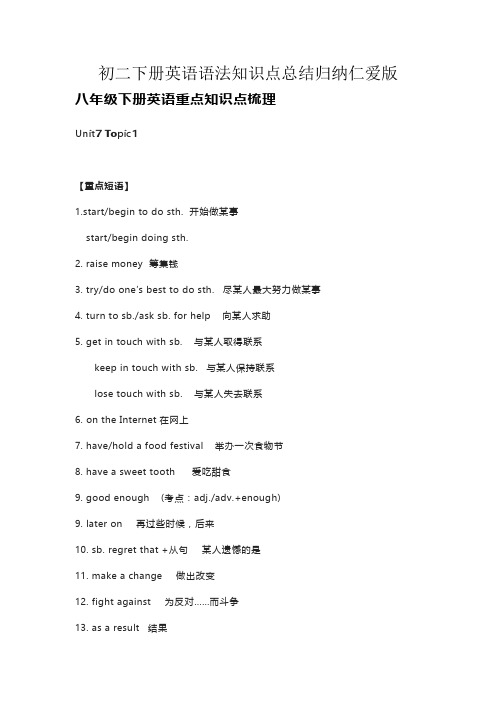
初二下册英语语法知识点总结归纳仁爱版八年级下册英语重点知识点梳理Unit7 Topic1【重点短语】1.start/begin to do sth. 开始做某事start/begin doing sth.2. raise money 筹集钱3. try/do one’s best to do sth. 尽某人最大努力做某事4. turn to sb./ask sb. for help 向某人求助5. get in touch with sb. 与某人取得联系keep in touch with sb. 与某人保持联系lose touch with sb. 与某人失去联系6. on the Internet在网上7. have/hold a food festival 举办一次食物节8. have a sweet tooth 爱吃甜食9. good enough (考点:adj./adv.+enough)9. later on 再过些时候,后来10. sb. regret that +从句某人遗憾的是11. make a change 做出改变12. fight against 为反对……而斗争13. as a result 结果14. child workers 童工15. thank you for doing sth.因为做某事而感谢某人16. make one’s dream come truerealize / achieve one's dream使某人的梦想实现【词形转换】1. success n.成功, 胜利succeed v.successful adj.2. west n.西方,西部western adj.西方的,西部的3. Greece n.希腊Greek adj.希腊的 n.希腊人4. India n.印度Indian adj.印度的,印第安人的n.印度人,印第安人5. fry v.油炸,油煎fried adj. 油炸的6. Italy n.意大利Italian adj.意大利(人)的,意大利语的n.意大利人,意大利语7. Africa n.非洲African adj.非洲的,非洲人的n.非洲人8. Russia n.俄国Russian adj.俄国(人)的,俄语的n.俄国人,俄语【重点句型】1. When and where shall we have the food festival?我们什么时候在哪儿举办食物节?2. Let’s try our best to make it a success.让我们尽我们做大的努力使它成为一件成功的事情。
人教版八年级下册英语重点词汇,短语,句型,语法总结

Unit 1 will people haverobots?重点词汇: probably;able;interview;company;shape;impossible.二、重点短语:1.be scared of sb./sth.恐惧某人/某物2.go up 上升, 与rise 同义, 与go down 或set 相反3.make a noise 发出声响, 吵闹4.arrive in 到达,表示到达某一城市、国家等大地方时,用介词in;表示到达某一村庄、车站等小地方时,用介词at ;到达的地方用副词表示时,可不用介词。
5.not…until…直到……才……6.see…doing…停止做某事7.go cycling 相当于go to ride a bike ,意思是去骑车。
8.nit sb.on the head 表示“打某人的头”,表示的“打某人的脸”要用hit sb.in the face 。
9.turn around 转身10.fall off 摔下来11.give sb.a push 推某人一下12.help sb.do sth.= help sb.with sth.帮助某人做某事13.get off 从……下来, 通常指下火车、巴士、轮船、飞机等。
14.think about 思考、想起、想到(某人或某事)15.all day 一整天16.one by one 一个接一个地, 类似有year by year 一年又一年;day by day 一天又一天。
17.hold on 有两个意思,一个是“(电话)不挂断”;一个是“抓紧”。
e down 下来三、重难点解析:1.比较级: less 最高级least2.agree: 1) 表示“同意某人意见”时用agree with sb, 该短语不能用于被动语态。
2) 表示“同意(某计划、办法、建议、条件)”时, 用agree to(to在此用作介词, 其后接名词、代词或者相当于名词的成分), 该短语可以用于被动语态。
人教版八年级英语下册重点短语句型语法(精华全面)

八年级下册英语短语、句型及语法Unit 1 What’s the matter?一、重点短语1. have a fever 发烧2. have a cough 咳嗽3. have a toothache 牙疼4. talk too much 说得太多5. drink enough water 喝足够的水6. have a cold 受凉;感冒7. have a stomachache 胃疼8. have a sore back 背疼9. have a sore throat 喉咙痛10. lie down and rest 躺下来休息11. hot tea w ith honey 加蜂蜜的热茶12. see a dentist 看牙医13. get an X-ray 拍X 光片14. take one’ s temperature 量体温15. put some medicine on sth. 在……上面敷药16. feel very hot 感到很热17. sound like 听起来像18. all weekend 整个周末19. in the same way 以同样的方式20. go to a doctor 看医生21. go along 沿着……走22. on the side of the road 在马路边23. shout for help 大声呼救24. without th inking twice 没有多想25. get off 下车26. have a heart problem 有心脏病27. to one’ s surprise 使....... [京讶的28. thanks to 多亏了;由于29. in time 及时30. save a life 挽救生命31. get into trouble 造成麻烦32. right away 立刻;马上33. because of 由于34. get out of 离开;从……出萍35. hurt oneself 受伤36. put a bandage on sth. 用绷带包扎37. fa ll down 摔倒38. feel sick 感到恶心39. have a nosebleed 流鼻血40. cut his knee 割伤他的膝盖41. put her head back 把她的头向后仰42. have problems breathing 呼吸困难43. mountain climbing 登山运动44. be used to doing sth. 习惯做某事45. run out (of) 用完;用尽46. so that 以便47. so. . . that 如此… …以至于…48. be in control of 掌管;管理49. in a difficult situation 在闲境屮50. keep on doing sth. 继续或坚持做某事51. make a decision 做出决定52. take risks 冒险53. give up 放弃二、重点句型1. Wha t’ s the matter?Wha t’ s the matter with you?= What’s the trouble w ith you?= Wha t’ s wrong with you? 你怎么了?2. What should she do?她该怎么办呢?Should I take my temperature?我应该量一下体温吗?主语+ should/shouldn’t + 动词原形. ..①You should lie down and rest.你应该躺下休息一会儿。
人教版八年级下册英语Unit 6单元语法知识点总结

人教版八年级下册英语Unit 6单元语法知识点总结本单元重点短语的具体用法1. watch TV:看电视。
例如:I like to watch TV in the evening.(我喜欢晚上看电视。
)2. read a newspaper:看报纸。
例如:He reads a newspaper every morning.(他每天早上看报纸。
)3. talk on the phone:通过电话交谈。
例如:She is talking on the phone with her friend.(她正在和朋友通电话。
)4. listen to a CD:听CD。
例如:I often listen to a CD to relax.(我经常听CD 来放松。
)5. a useful book:一本有用的书。
例如:This is a very useful book for learning English.(这是一本学习英语非常有用的书。
)6. make soup:做汤。
例如:My mom is making soup in the kitchen.(我妈妈正在厨房做汤。
)7. wash the dishes:洗碟子。
例如:It's your turn to wash the dishes.(轮到你洗碟子了。
)8. go to the movies:去看电影。
例如:Let's go to the movies this weekend.(我们这周末去看电影吧。
)9. at home:在家。
例如:I stayed at home all day yesterday.(我昨天一整天都待在家里。
)10. eat out:在外面吃。
例如:We decided to eat out instead of cooking.(我们决定出去吃而不是做饭。
)11. drink tea:喝茶。
例如:Do you like to drink tea or coffee?(你喜欢喝茶还是咖啡?)12. Dragon Boat Festival:端午节。
人教版八年级下册英语Unit 3单元语法知识点总结

人教版八年级下册英语Unit 3单元语法知识点总结本单元重点短语的具体用法1. do the dishes:洗餐具- I need to do the dishes before going out.(我出门前需要洗餐具。
)2. take out the rubbish:倒垃圾- Can you take out the rubbish, please?(你能倒一下垃圾吗?)3. fold your clothes:叠衣服- Remember to fold your clothes neatly.(记得把你的衣服叠整齐。
)4. sweep the floor:扫地- She sweeps the floor every day.(她每天都扫地。
)5. make your bed:整理床铺- It's your turn to make your bed.(轮到你整理床铺了。
)6. clean the living room:打扫客厅- We need to clean the living room before guests arrive.(在客人到来之前,我们需要打扫客厅。
)7. go out for dinner:出去吃饭- Let's go out for dinner tonight.(我们今晚出去吃饭吧。
)8. go to the movies:去看电影- They like to go to the movies on weekends.(他们喜欢在周末去看电影。
)9. stay out late:在外面待到很晚- Don't stay out late, it's not safe.(别在外面待太晚,不安全。
)10. get a ride:搭车- I'll get a ride with my friend.(我会和我朋友一起搭车。
)11. work on doing sth:从事做某事- He is working on writing a novel.(他正在写一本小说。
人教版八年级英语下册单词-短语-句型和语法总结

Unit1 What’s the matter?【重点单词】matter [ˈmætə] v. 重要,要紧,有关系What’s the matter? 怎么了?出什么事了?sore [sɔ:(r)] adj. 疼痛的,酸痛的have a cold 感冒stomach ['stʌmək] n. 胃,腹部stomachache ['stʌməkeɪk] n. 胃痛,腹痛have a stomachache 胃痛foot(复数feet) [fu:t] n. 脚neck [nek] n. 颈,脖子throat [θrəʊt] n. 喉咙fever ['fi:və] n. 发烧,发热lie [laɪ] v. 躺,平躺lie down 躺下rest [rest] n. 剩余部分,其余;放松,休息cough [kɒf] n. & v. 咳嗽X-ray ['eksreɪ] n. X光,X射线toothache [ˈtu:θeɪk] n. 牙痛take one's temperature 量体温headache [ˈhedeɪk] n. 头痛have a fever 发烧break [breɪk] n. & v. 休息,暂停;打破take breaks (take a break)休息hurt [hə:t] v. 伤害,损害,使受伤passenger ['pæsɪndʒə] n. 乘客,旅客off [ɒf] adv. prep. 离开(某处);从…去掉get off 下车to one's surprise 使…惊讶,出乎…意料onto [ˈɒntə] prep. 向,朝trouble [ˈtrʌbl] n. 麻烦,烦扰,问题hit [hit] n. & v. 碰撞,打,打击right away 立即,马上get into 陷入,参与herself [hə:ˈself] pron. 她自己,她本身(she的反身代词)bandage ['bændɪdʒ] n. & v. 绷带;用绷带包扎sick [sɪk] adj. 患病的,不适的knee [ni:] n. 膝盖nosebleed [ˈnəʊzbli:d] n. 鼻出血breathe [bri:ð] v. 呼吸sunburned [ˈsʌnbɜ:nd] adj. 晒伤的ourselves [ɑ:ˈselvz] pron. 我们自己(we的反身代词)climber [ˈklaɪmə(r)] n. 登山者be used to 习惯于… 适应于…risk [rɪsk] n. & v. 风险,危险;冒险take risks (take a risk) 冒险accident [ˈæksidənt] n. 意外事件;事故situation [ˌsitjuˈeiʃən] n. 状况,形式,情况kg=kilogram [ˈkɪləgræm] n. 公斤,千克rock [rɔk] n. 岩石run out (of) 用尽,耗尽knife [naif] n. 刀,餐刀cut off 切除blood [blʌd] n. 血mean [mi:n] v. 意味着,意思是,意欲get out of 离开,从… 出来importance [ɪmˈpɔ:tns] n. 重要性decision [dɪ'sɪʒn] n. 决心,决定,抉择control [kən'trəʊl] v. 控制,支配,操纵be in control of 掌管,管理spirit ['spɪrɪt] n. 勇气,意志death [deθ] n. 死亡give up 放弃nurse [nə:s] n. 护士【重点短语】1.have a fever 发烧2.have a cough 咳嗽3.have a toothache 牙疼4.talk too much 说得太多5.drink enough water 喝足够的水6.have a cold 受凉;感冒7.have a stomachache 胃疼8.have a sore back 背疼9.have a sore throat 喉咙痛10. take risks 冒险11.hot tea with honey 加蜂蜜的热茶12.see a dentist 看牙医13.get an X-ray 拍X 光片14.take one’ s temperature 量体温15.put some medicine on sth. 在……上面敷药16. give up 放弃17. sound like 听起来像18. all weekend 整个周末19. in the same way 以同样的方式20. go to a doctor 看医生21. go along 沿着……走22. on the side of the road 在马路边23. shout for help 大声呼救24. without thinking twice 没有多想25. get off 下车26. have a heart problem 有心脏病27. to one’ s surprise 另某人惊讶的是28. thanks to 多亏了;由于29. in time 及时30. make a decision 做出决定31. get into trouble 造成麻烦32. right away 立刻;马上33. because of 由于34. get out of 离开;从……出来35. keep on doing sth. 继续或坚持做某事36. put a bandage on sth. 用绷带包扎37. fall down 摔倒38. feel sick 感到恶心39. have a nosebleed 流鼻血40. cut his knee 割伤他的膝盖41. put her head back 把她的头向后仰42. have problems breathing 呼吸困难43. mountain climbing 登山运动44. be used to doing sth. 习惯做某事45. run out (of) 用完;用尽46. so that 以便47. so...that... 如此……以至于...…48. be in control of 掌管;管理49. in a difficult situation 在闲境中【重点句型】1. What's the matter with you?= What'the trouble with you? = What's wrong with you? 你怎么了?2. What should she do? 她该怎么办呢?3.Should I take my temperature? 我应该量一下体温吗?4.You should lie down and rest. 你应该躺下休息一会儿。
- 1、下载文档前请自行甄别文档内容的完整性,平台不提供额外的编辑、内容补充、找答案等附加服务。
- 2、"仅部分预览"的文档,不可在线预览部分如存在完整性等问题,可反馈申请退款(可完整预览的文档不适用该条件!)。
- 3、如文档侵犯您的权益,请联系客服反馈,我们会尽快为您处理(人工客服工作时间:9:00-18:30)。
八年级下册重点语法和短语Unit 1 Will people have robots?重点语法:一般将来时态的应用do/does 的一般将来时态形式:(shall/will) dodo/does 的一般将来时态的被动语态:(shall/will) be done一般将来时态的肯定句、否定句、疑问句形式:肯定句例句:People will have robots in a few years.否定句例句:People (will not/won't) have robots in a few years.一般疑问句例句:Will people have robots in a few years?特殊疑问句例句:What will people have in a few years?重点短语:won't = will notthey'll = they willshe'll = she willhe'll = he willI'll = I willfall in love with(sb./sth.) 爱上(某人/某物)be able to do sth. 能够做某事come true 实现in the future 未来hundreds of 数以百计的thousands of 数以千计的look for(sb./sth.) 寻找(某人/某物)will → would 情态动词will 的原形和过去式may → might 情态动词may 的原形和过去式Reading Strategy(阅读方法)Look at the title and picture, and predict what you will read about. (看着标题和图片,预知你要阅读那些方面的内容。
)This helps you get ready to acquire new information. (这样可以帮助你获得一些新的信息。
)Unit 2 What should I do?重点语法:过去将来时态(将来时态的委婉说法)do/does 的过去将来时态形式:(should/would) dodo/does 的过去将来时态的被动语态:(should/would) be done过去将来时态的肯定句、否定句、疑问句形式:肯定句例句:You should write a letter to him.否定句例句:You shouldn't write a letter to him.一般疑问句例句:Should I write a letter to him?特殊疑问句例句:What should I do?重点短语:keep sb. out 不让某人进入What's wrong? = What's the matter? = What's the problem? 怎么了?out of style 不时髦的;过时的call sb. up 给某人打电话pay for sth. 为某事付款part-time job 兼职工作the same as = be same (to/with) 与……同样in style 时髦的;流行的get on [well] with sb. = get along [well] with sb. 与某人相处(好)didn't = did notcouldn't = could notas ... as possible 尽可能……(eg/ as soon as possible 尽快)all kinds of 各种;许多on the one hand 一方面on the other hand 另一方面ask sb. for sth. = ask sb. to do sth. 请求某人做某事ask sb. not to do sth. 请求某人不要做某事spend (money) on sth. = spend (money) [in] doing sth. 花钱做某事sth. cost sb. (money) 某人花钱为了某事take sb. sometime to do sth. 花某人时间做某事find out 查明find sb. doing sth. 发现某人做某事be angry with sb. 生某人的气be angry at sth. 生某事的气the same age as = as old as 与某人年龄一样have fight with sb. 与某人打架learn to do sth. 学会做某事not ... until ... 直到……才……compare sth.(A) with sth.(B) 把某事(A)与某事(B)作比较it's time for sth. = it's time to do sth. 到该做某事的时间了maybe adv. 或许may be (情态动词+ 动词原形)可能是shall → should 情态动词shall 的原形和过去式pay → paid → paid 动词pay 的原形、过去式和过去分词Reading Strategy(阅读方法)You will learn to use new words better if you use a learner's dictionary. (时刻学着应用新单词来学习比时刻使用字典这种途径方法更好。
)A bilingual dictionary sometimes gives the wrong meaning for the situation you want. (在某些你需要的场合下,一本双语字典有时会给你错误的解释。
)Unit 3 What were you doing when the UFO arrived?重点语法:过去进行时态do/does 的过去进行时态形式:(was/were) doingdo/does 的过去进行时态的被动语态:(was/were) being done过去将来时态的肯定句、否定句和疑问句形式:肯定句例句:I was walking down the street when a UFO landed.否定句例句:I wasn't walking down the street when a UFO landed.一般疑问句例句:Were you walking down the street when a UFO landed?特殊疑问句例句:What were you doing when a UFO landed?动词when 和while 的选择:when 后加瞬间动词,while 后加延续性动词。
例句:The boy was walking down the street when the UFO landed.=While the boy was walking down the street, the UFO landed.感叹句结构:(1) How + adj. + the + 主语+ 谓语动词=(2) What + (a/an) + [adj.] + n. + 主语+ 谓语动词例句:What a beautiful flower [it is]!=How beautiful the flower is!What beautiful flowers [they are]!=How beautiful the flowers are!重点短语:get out 出去;离开take off 起飞run away 逃跑;跑掉come in 进来hear about = hear of 听说take place 发生as ... as 像……一样(eg/ as old as him 像他一样老)anywhere = everywhere = here and there 任何地方think about 考虑think of 认为get up = get out of the bed 起床at the doctor's 在诊所every day 每一天everyday adj. 日常的most adj. 大部分the most 最多的in space 在太空中national hero 民族英雄all over the world = in the world 全世界Reading Strategy(阅读方法)The title can be helpful for you to understand a text. (一篇文章的标题可以帮助你理解整篇文章。
)It's also a good idea to read the first sentence of each paragraph before you read. (在阅读整篇文章之前,阅读每段的第一句话也是一个很有效的方法。
)Unit 4 He said I was hard-working.重点语法:宾语从句结构:主语+ 谓语动词+ 宾语从句(主语+ 谓语动词+ 宾语/表语)例句:----I'm good at English. He says. (改为加宾语从句的复合句)----He says I'm good at English.注意:①主句是一般现在时态,宾语从句的时态不受其影响。
例句:He says I'm good at English now.He says I was good at mathematics when I was young.②主句是过去时态,宾语从句也要用过去时态。
例句:He said I was good at mathematics when I was young yesterday.He said I was good at English now yesterday.③宾语从句是客观真理时永远用一般现在时态。
例句:Our teacher says 24 hours make a day.Our teacher said the sun gives us so many energy yesterday.④动词原形不能作主语,必须用其-ing 形式。
例句:She said helping others changed her life.重点短语:direct speech 直接引语reported speech = indirect speech 间接引语first of all = at first 首先pass on 传递be supposed to do sth. 应该做某事be good at = do well in 在某方面做得好in good health 身体健康get over 克服open up 打开care for = take care of = look after 照料;照顾not any more = not any longer = no longer 不再have a cold 感冒end-of-year exam 年终考试get nervous 变得紧张forget to do sth. 忘记做某事(该事未做)forget doing sth. 忘记做某事(该事已做)it's + adj. + [for sb.] + to do sth. 做某事[对某人来说]……(加形容词)context 上下文Reading Strategy(阅读方法)First read for meaning, not for detail. (首先理解文段的大致意思,不在于文段的细节部分。
